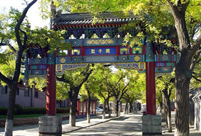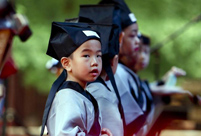 Post-90s beauty boxer grapples four men
Post-90s beauty boxer grapples four men
 3,000-year-old tea town through lenses
3,000-year-old tea town through lenses
 22 archaeological sites along Silk Road in China
22 archaeological sites along Silk Road in China
 Football babies, Samba dancers embrace 'World Cup'
Football babies, Samba dancers embrace 'World Cup'
 Beautiful scenery along China’s Grand Canal
Beautiful scenery along China’s Grand Canal
 High speed train attendants receive training in Chongqing
High speed train attendants receive training in Chongqing
 Rare rainbow clouds seen in Fujian
Rare rainbow clouds seen in Fujian
 Small bracelet going global
Small bracelet going global
 Aerial Photography: Amazing Tianshan Mountains
Aerial Photography: Amazing Tianshan Mountains
 'Animals' in 2014 World Cup
'Animals' in 2014 World Cup
The Japanese cabinet has approved a resolution that would allow the country to exercise the right of collective self-defense by reinterpreting the Pacifist Constitution.
The resolution sets three conditions that would enable exercise of the right including "clear danger" to the lives of its people due to armed attacks on Japan or "countries with close ties".
The move is an overhaul of Japan’s exclusively defense-oriented security policy after World War II and over half of Japanese are against it.
Chinese Foreign Ministry spokesman Hong Lei said that China is opposed to Japan's pursuit of its domestic political goals by deliberately inventing a "China threat", and urged Japan to respect the legitimate security concerns of its Asian neighbors and deal prudently with relevant issues. He said that Japan must not undermine China's sovereignty and security interests, nor should it harm regional peace and stability.
Japan’s removal of the ban on collective self-defense comes at a time of strained Sino-Japan relations, said Yuan Yang, a researcher with the Academy of Military Sciences of PLA. According to Yuan, China’s rapid economic and military development is the motive behind Japan’s move to constrain China.
Yuan Yang believes that lifting the ban on collective defense would ease certain restrictions on the Japanese military forces and might lead to gradual expansion of its military capability.
Yuan points out that Japan’s emphasis on "countries with close ties", rather than confining itself to its allies, increases the possibility of conflict between China and Japan. There is now the possibiltiy that the two countries might clash over issues related to third parties as well as the Diaoyu Island issue and other issues in the East China Sea.
Zhou Yongsheng, a professor with the China Foreign Affairs University, has also noted that the most serious consequence of removing the ban on collective self-defense might be a military alliance betweeen Japan and countries like the Philippines and Vietnam.
Faced with this situation, China needs to show the world that with peaceful development as its basic state policy, it will never pose any threat to other countries. It should try to unite all peace-loving forces, especially peace forces in Japan, to prevent these Japanese government moves. But China also needs to make it clear to the world that with its own strengthened military forces, it has nothing to fear from the provocative actions of other countries.
 Featured hutongs in Beijing
Featured hutongs in Beijing Separate college entrance exam
Separate college entrance exam Flash mob dance
Flash mob dance Picturesque scenery of Ghost City
Picturesque scenery of Ghost City Children attend First Writing Ceremony
Children attend First Writing Ceremony Female master poses for graduation photos with son
Female master poses for graduation photos with son Silk Road, China's Grand Canal listed as World Heritage Sites
Silk Road, China's Grand Canal listed as World Heritage Sites PKU students imitate famous paintings in real-person photos
PKU students imitate famous paintings in real-person photos Chinese 'Slumdog Millionaire'
Chinese 'Slumdog Millionaire' Islands in S. China Sea better shown on new vertical atlas of China
Islands in S. China Sea better shown on new vertical atlas of China Girl takes father’s portrait to travel the world
Girl takes father’s portrait to travel the world Images of Xi'an: Part one
Images of Xi'an: Part one In Pictures: Female fans of World Cup
In Pictures: Female fans of World Cup Top 20 hottest women in the world in 2014
Top 20 hottest women in the world in 2014  China's top 10 representative architectures
China's top 10 representative architecturesDay|Week|Month